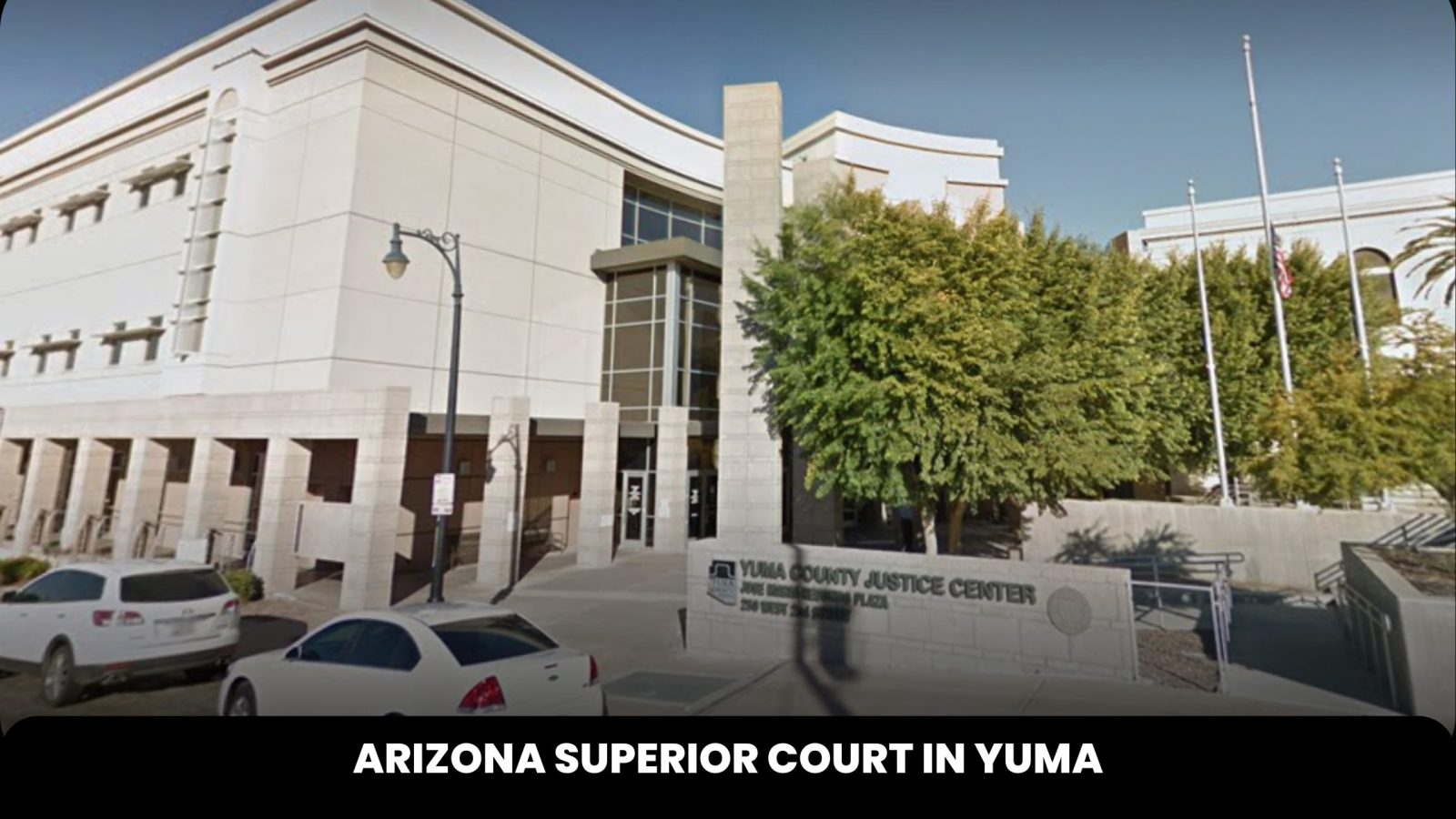Arizona Superior Court in Yuma County: A Comprehensive Overview
Address
Location: 250 W 2nd St, Yuma, AZ 85364, United States
Google Maps Code: P9FG+FW Yuma, Arizona, USA
Contact Details
Phone Number: +1 928-817-4083
Website: Arizona Superior Court – Yuma County
Operating Hours
- Monday – Friday: 8:00 AM – 5:00 PM
- Saturday – Sunday: Closed
Introduction to Arizona Superior Court in Yuma County
The Arizona Superior Court in Yuma County is a vital component of the state’s judicial system, tasked with handling a diverse array of legal cases, including civil, criminal, family law, and juvenile matters. Established during Arizona’s territorial era, this court continues to serve Yuma County residents with dedication and efficiency.
With jurisdiction extending across all cities and towns in Yuma County, the court ensures the enforcement of state and federal laws while resolving disputes and upholding judicial fairness.
Cases Handled by Arizona Superior Court
The court addresses a variety of cases, including:
- Civil Cases: Disputes involving contracts, personal injury, property issues, and more.
- Criminal Cases: Includes misdemeanors, felonies, and juvenile offenses.
- Family Law: Matters such as divorce, child custody, and adoption.
- Juvenile Cases: Addresses crimes or family law needs involving minors.
Filing a Case in Arizona Superior Court
Steps to File:
- Eligibility: Ensure you have a valid claim and standing in the case.
- Form Completion: Access required forms online or at the clerk’s office.
- Submission: File the forms with the court and pay applicable fees.
Fees:
Filing fees vary based on case type and claim size. A detailed fee schedule is available on the court’s website.
Judges and Staff
- Judges’ Qualifications: Licensed attorneys in Arizona, appointed or elected, with continuous legal education requirements.
- Court Staff Responsibilities: Manage filings, maintain court records, and assist the public in navigating legal procedures.
Court Procedures
- Pretrial: Filing motions, gathering evidence, and preparing for trial.
- Trial: Presentation of evidence and arguments before a judge or jury.
- Post-Trial: Appeals, enforcement of rulings, or resolution of any remaining issues.
Alternative Dispute Resolution (ADR)
ADR offers a less formal, cost-effective way to settle disputes.
- Options Available: Mediation, arbitration, and negotiation.
- Benefits: Faster resolutions, reduced costs, and preserved relationships.
Jury Duty
Serving on a jury is an essential civic duty.
- Eligibility: U.S. citizen, Yuma County resident, aged 18 or older, without serious criminal convictions.
- Responsibilities: Impartially evaluate evidence, deliberate with fellow jurors, and deliver a verdict.
Access to Court Records
Court records can be accessed:
- Online: Via the court’s website.
- In-Person or Mail: Visit the clerk’s office for physical copies.
- Fees: May apply for copies or electronic access.
Public and Community Services
- Court Services: Filing assistance, interpreter services, and access to records.
- Community Programs: Legal education, outreach initiatives, and justice accessibility programs.
Access to Justice Programs
These initiatives ensure equitable legal access:
- Legal Aid: Free or low-cost legal services for eligible individuals.
- Mediation Programs: Cost-effective resolution methods for disputes.
Court Technology
Advanced technologies enhance efficiency and accessibility:
- Resources: Online filings, video conferencing, and digital records.
- Advantages: Faster case processing and improved security.
Community Outreach
The court actively engages with the community through:
- Education Programs: Raising awareness about legal processes.
- Engagement Events: Hosting workshops, volunteer programs, and initiatives targeting underserved populations.
Additional Resources
- Case Lookup: Accessible online or via the clerk’s office.
- Court Docket: Information on scheduled hearings.
- Justice Court: Handles small claims, traffic violations, and misdemeanors.
Conclusion
The Arizona Superior Court in Yuma County is committed to delivering justice efficiently and equitably. Whether navigating a legal case, serving as a juror, or seeking court services, the court’s resources and dedicated personnel ensure accessible and fair judicial proceedings.
FAQs
What cases are handled by the court?
Civil, criminal, family law, and juvenile cases.
How do I file a case?
Complete forms, submit them, and pay the fees.
What is ADR?
Alternative Dispute Resolution offers faster, cost-effective dispute resolution methods.
How can I access court records?
Online, in person, or by mail.
What are public services offered?
Filing assistance, interpreters, and community education programs.
What is Superior Court in Arizona?
The Arizona Superior Court is a court of general jurisdiction, which means it handles a wide variety of cases, including civil, criminal, family law, probate, and juvenile cases. Each county in Arizona has a Superior Court to serve its residents.
What kinds of cases are heard in Superior Court?
Superior Courts in Arizona handle:
Civil cases involving disputes over contracts, property, or personal injury claims.
Criminal cases, including felonies and some misdemeanors.
Family law cases such as divorce, child custody, and support issues.
Juvenile cases involving delinquency or dependency matters.
Probate matters, like wills and estates.
Tax cases and other specialized legal disputes.
Does each county in Arizona have a Superior Court?
Yes, every county in Arizona has its own Superior Court. This includes Yuma County, Maricopa County, Pima County, and others.
How many Superior Courts are in Arizona?
Arizona has 15 Superior Courts, one for each of its counties.
Where is the Superior Court located?
The Arizona Superior Court is located in the county seat of each county. For Yuma County, it is at 250 W 2nd St, Yuma, AZ 85364.
What does the Superior Court do?
The Arizona Superior Court oversees legal matters such as civil lawsuits, criminal trials, family law disputes, probate, and juvenile cases. It also handles appeals from lower courts and administers jury trials.
What cases go to Superior Court?
Superior Courts in Arizona hear:
Felony criminal cases.
Family law matters like divorce and custody.
Civil cases with disputes over $10,000.
Juvenile dependency or delinquency cases.
Probate cases involving estates and guardianships.
Are court cases public records?
Yes, most court cases in Arizona are public records. Exceptions include cases involving juveniles, sealed records, or sensitive family matters like certain custody cases.
Are divorce records public in Arizona?
Yes, divorce records are generally public in Arizona unless sealed by the court. Access can be requested through the Superior Court where the divorce was filed.
How do I find court records online?
Court records in Arizona can be accessed via the Arizona Judicial Branch’s Public Access Case Lookup or directly from the website of the Superior Court in the respective county.
How do I find out when my court date is?
You can find your court date by:
Checking the court docket online.
Contacting the Clerk of the Superior Court in your county.
Referring to any court-issued notices or documents.
What does the Clerk of the Superior Court do?
The Clerk of the Superior Court manages court records, processes filings, collects fees, and provides administrative support for court proceedings. They also issue marriage licenses and maintain public records.
What types of cases are heard in Superior Court?
The Superior Court hears cases such as felonies, major civil disputes, family law issues (e.g., divorce and custody), probate matters, and juvenile cases.
What is the purpose of the pretrial conference?
In Superior Court, a pretrial conference helps:
Narrow down issues before trial.
Resolve procedural matters.
Explore settlement opportunities without proceeding to a full trial.
What are minute entries?
Minute entries are official summaries of court proceedings recorded by the clerk. They detail actions taken during a hearing, including rulings, orders, and the next steps in the case.
What time does the Superior Court open?
Most Arizona Superior Courts, including Yuma County, operate Monday through Friday, 8:00 AM to 5:00 PM, excluding holidays.




